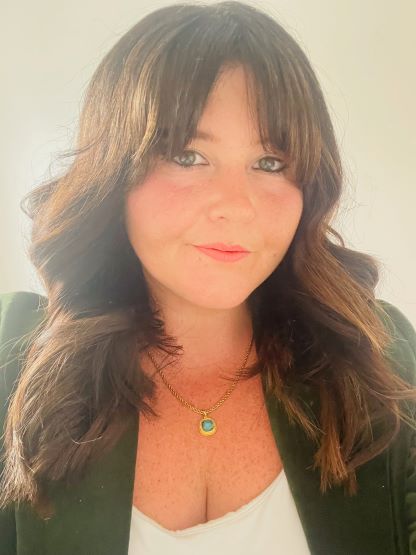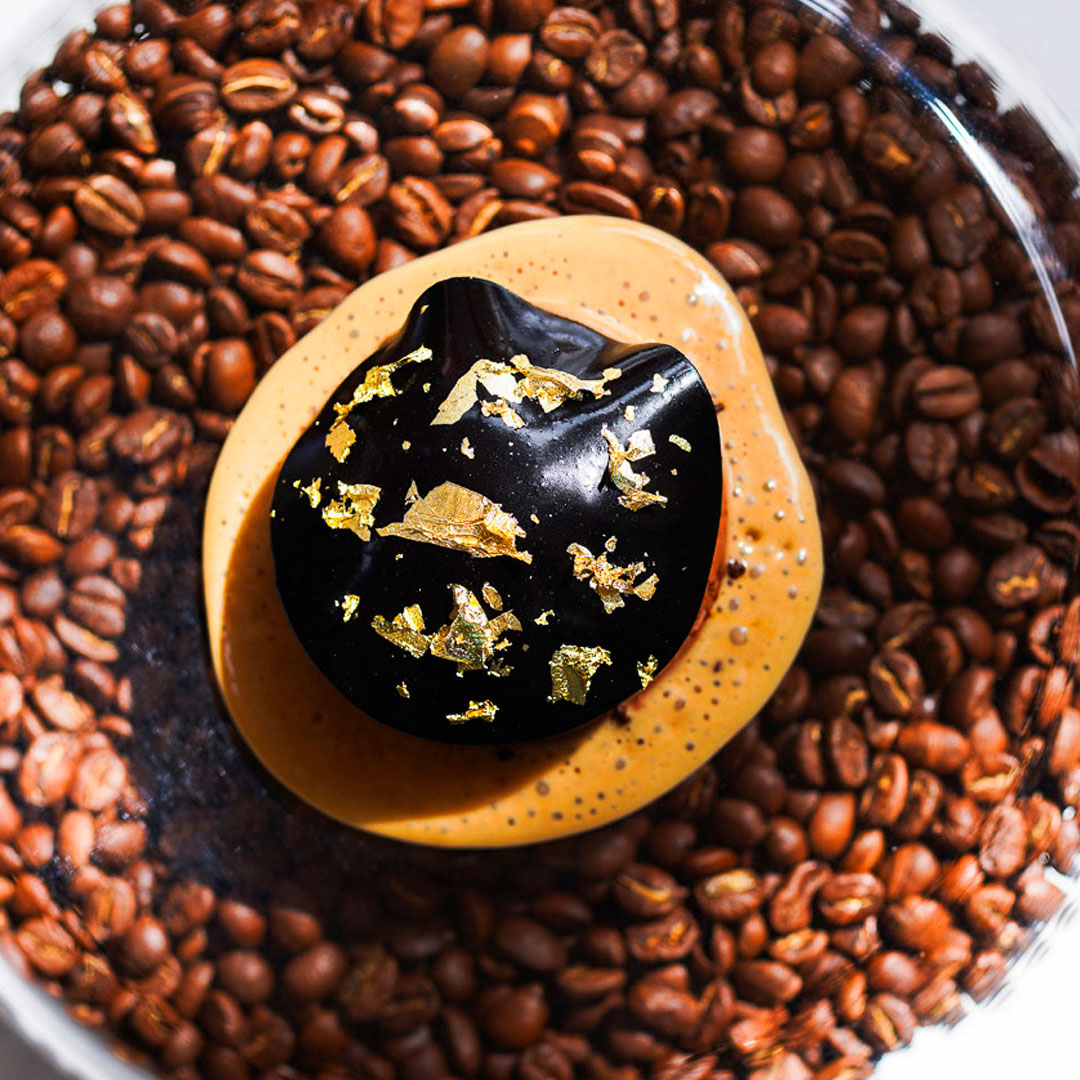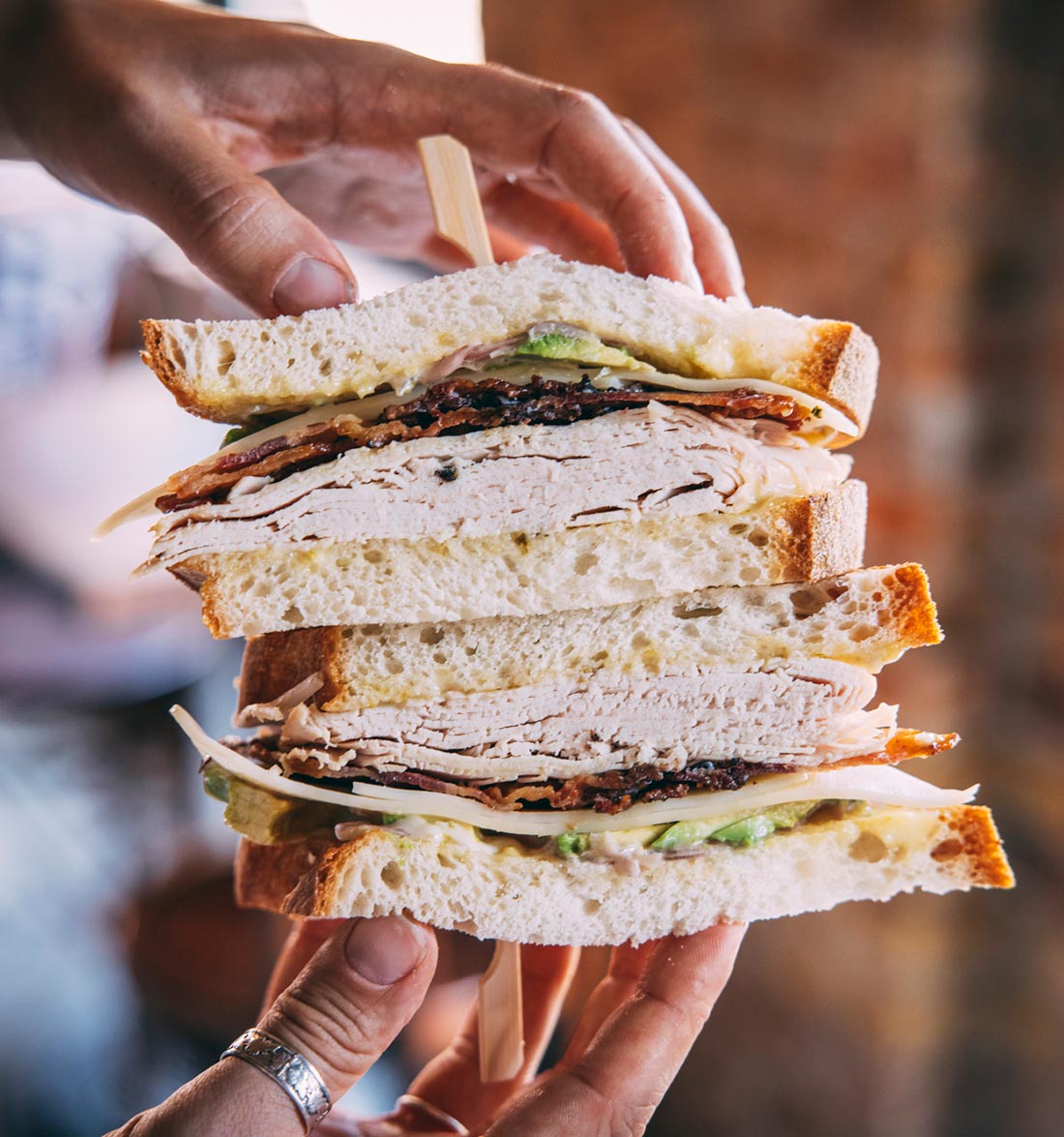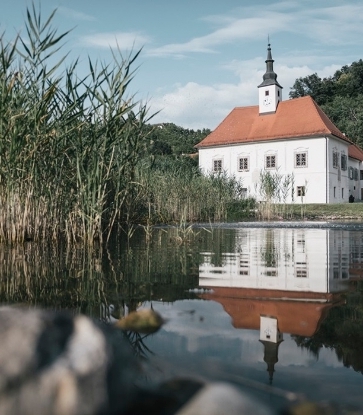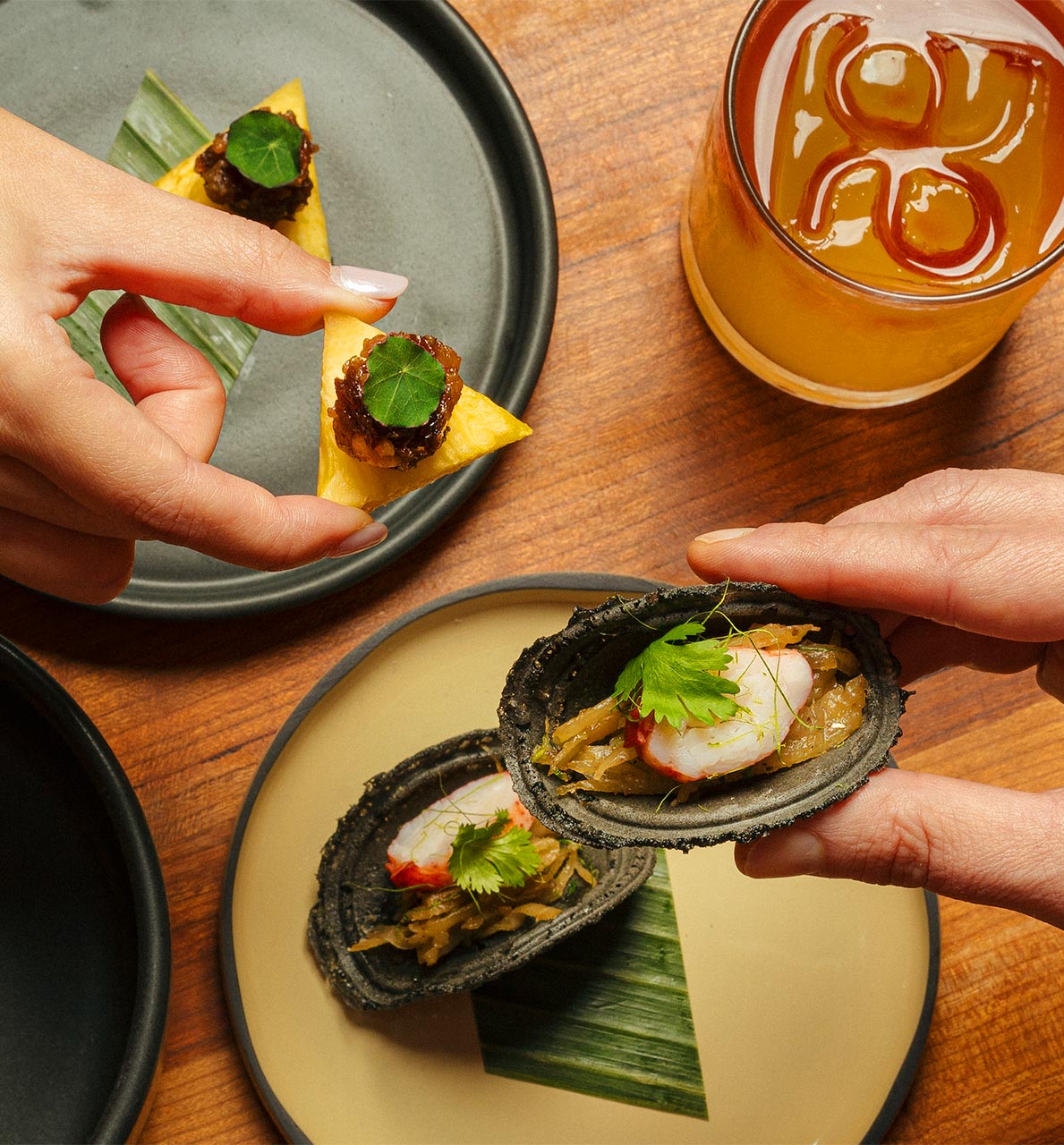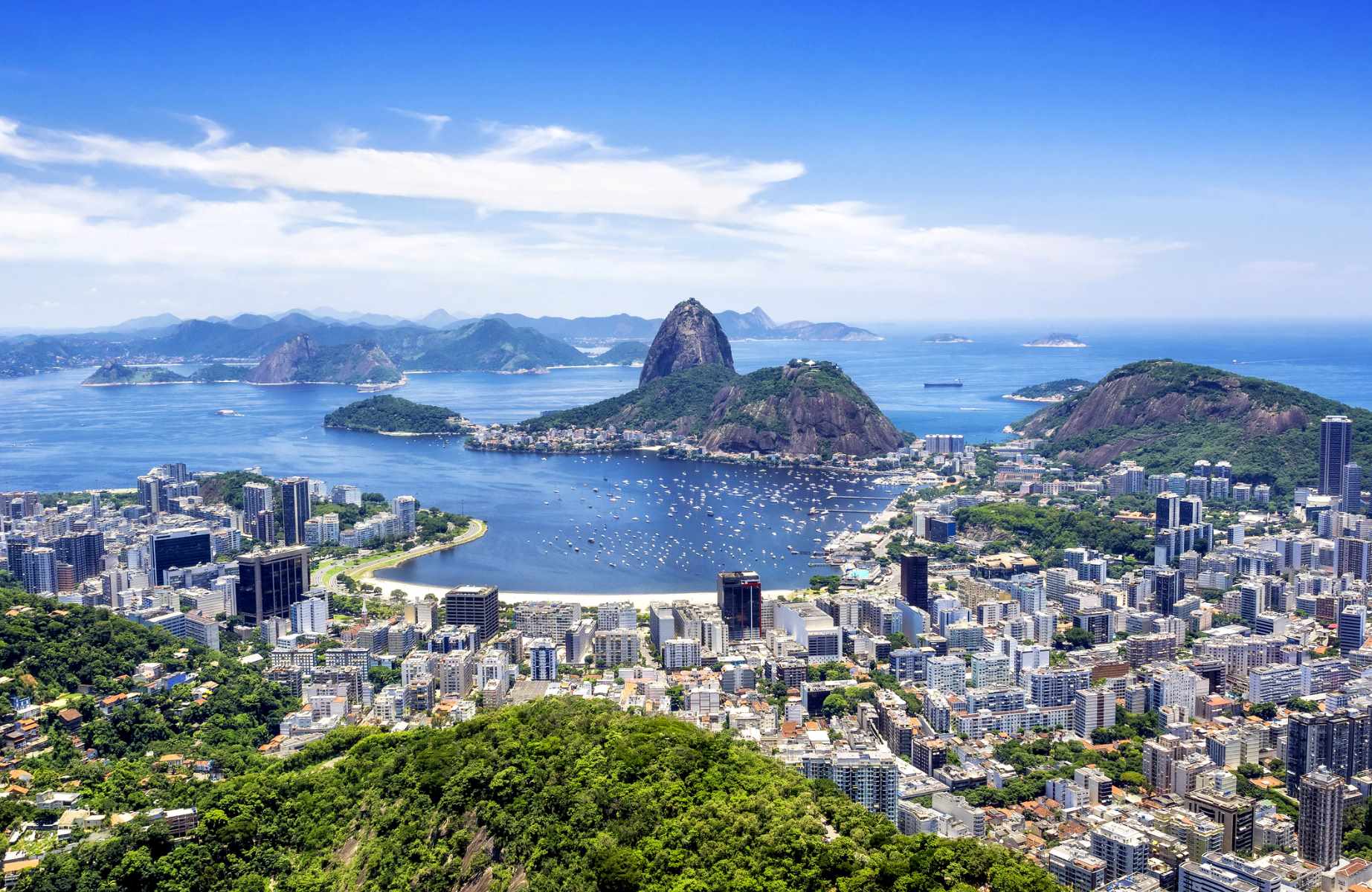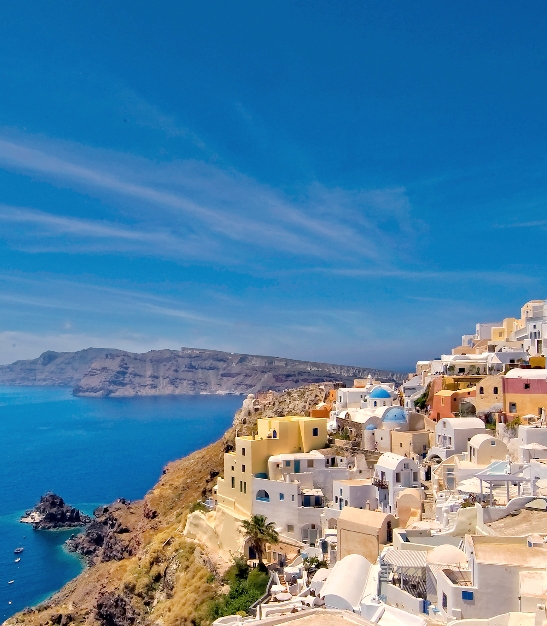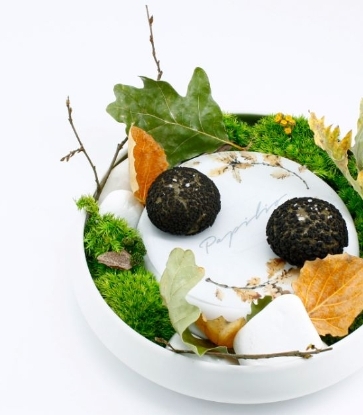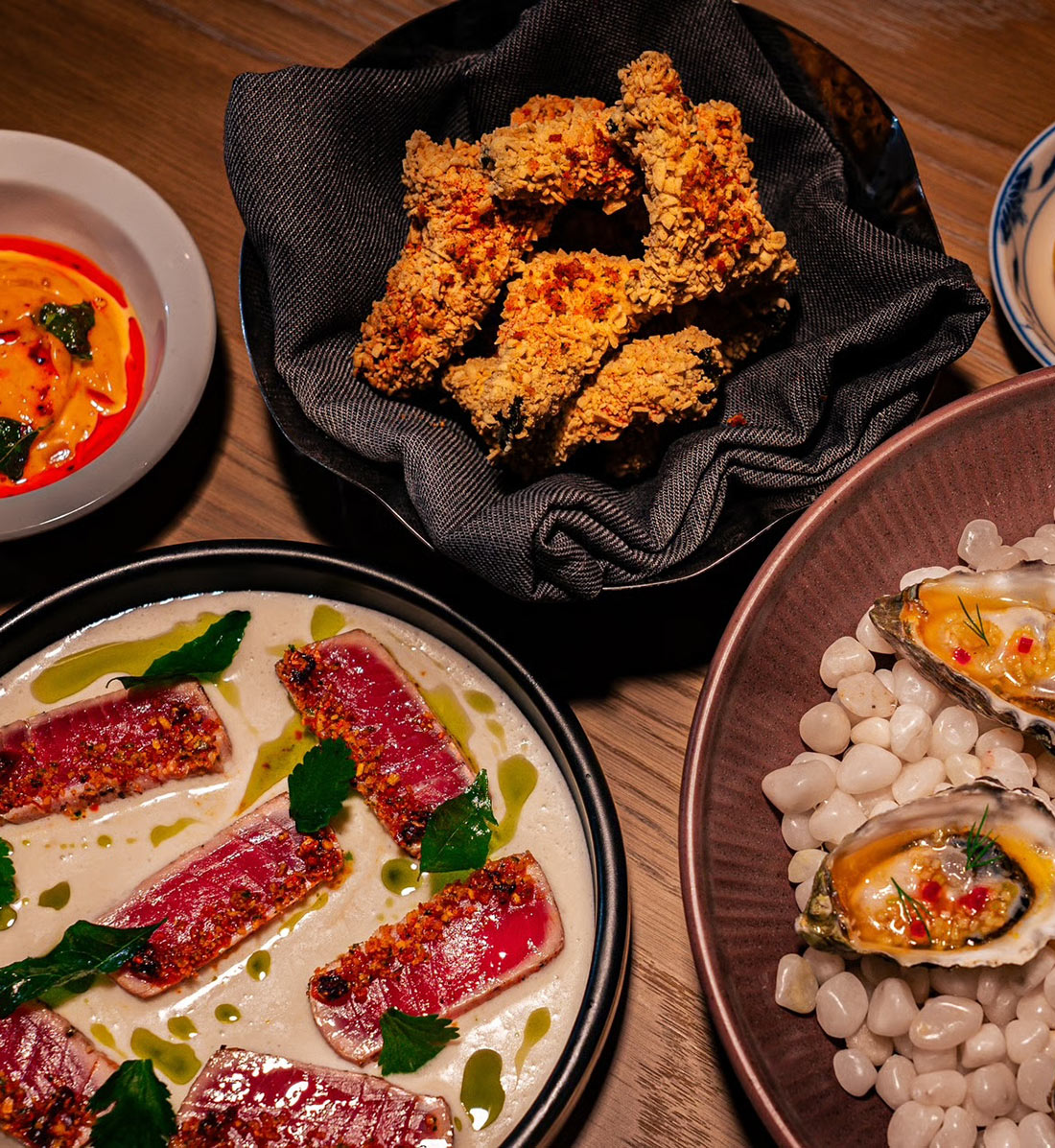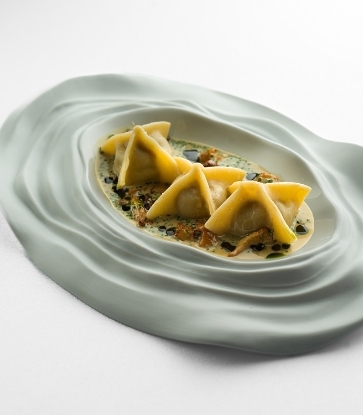Set in the shadow of basalt mountains and overlooking a vast lake, Villa Kabala is a destination restaurant that will delight those seeking an immersive local experience in rural Hungary. The villa lounges high in the forested hills of Hungary’s beautiful Badacsony region, on the north shore of Lake Balaton – an area famous for its historic character and winemaking.
Pulling up to the property, you’re greeted by an imposing cream exterior wrapped in wrought iron railings and topped with a sharply-sloping terracotta roof. At the front, a neat row of arches frames a spacious terrace. Look out from this vantage point and you’re treated to gleaming views of Lake Balaton – central Europe’s largest, shallowest lake – and luscious winemaking country, blanketed with vines and leaves.
The period property that houses Kabala was once home to artist István Farkas – one of the greatest Hungarian painters of the 20th century. Petra Terjék and Péter Fölföldi were living in Budapest in 2017 when they heard that the villa – in the picturesque village of Szigliget, just a few kilometres from Péter’s hometown – was on the market. They thought it over for just one day, before deciding to leave their city life behind for a different kind of adventure.
“We both love nature, animals, plants, rural values, being close to family, the mindset and attitude of the people, and of course, Lake Balaton,” Petra, who was born and raised in Budapest, explains. “Péter had been involved in gastronomy since childhood, while I came from the media world. We hoped that this combination, with the right humility and a lot of hard work, would bear fruit and lead to something special – this is how the idea of Villa Kabala was born. From the very first moment, we want to offer the best possible experience for our guests, not just a dinner or an overnight stay, but a complete experience.”

A Sustainable Experience Rooted In Local Terrain
Villa Kabala’s surroundings are unarguably breathtaking, but it’s the way that Petra and Péter have drawn from the landscape to cultivate their business – from kitchen to crockery – that makes a meal (and a stay) here such a stand-out experience. Their mission is to leave as small an ecological footprint as possible and to create long-term, sustainable hospitality. Indeed, the owners’ profound commitment to sustainability earned Villa Kabala a Michelin Green Star in the 2023 Guide, marking it out as a role-model establishment actively committed to sustainable gastronomy.“Sustainability has always been important to us, and we live by these principles in our private lives as well,” Petra explains. “The future of both ourselves and our families depends on how we and our environment live today, and what we do to create a more liveable world.”

Seasonally-Led Tasting Menus
Head Chef András Szabó has helmed the creative kitchen since 2018, deftly combining local – often family-produced – ingredients with modern technology to craft bold, eye-catching tasting menus.András’ ever-changing menus are influenced by harvests from the villa’s Walipini garden – an innovative year-round garden that’s partially buried to allow for both winter and summer growing. In spring and summer, the restaurant team gathers wild plants from nearby forests and meadows, while during the colder months, fermented vegetables and produce from the Walipini garden plays a central role in its menus. This year, the garden produced its first olive and pumpkin seed harvests, which will be pressed into oils for use in the kitchen.
Artisanal ingredients like cheese, butter, honey, sea buckthorn, fresh milk, truffles and mushrooms are all sourced from within a 5km radius, while meat comes from small local farms. When imports are unavoidable, the restaurant ensures they are fair trade.
Villa Kabala’s tasting menus are constantly evolving, with the kitchen’s delicate dishes ranging from duck and beef to guinea fowl with apple and cucumber rillette, and salmon trout filled with green lentils and bok choy. Each course is dainty, colourful, and stylishly-plated, and guests rave about the homemade bread and butter.
“András is a firm believer in innovative, creative and ever-changing tasting menus, mainly due to the focus on ingredient utilisation,” Petra says. “Like us, he prioritises a ‘zero waste’ mindset – nothing goes in the trash if it can be used creatively in our dishes.” In András’ kitchen, this means incorporating vegetable peels on the plate, whipping up sauces from meat and fish bones, and making chips from stale bread crusts. When it comes to meat, he uses every part of the animal. Meanwhile, the small amount of green waste that comes from the kitchen is composted for use in the garden.
In a unique touch, Villa Kabala invites guests to experience what it’s like to work in a kitchen driven by a sustainable philosophy – and pick up some new culinary skills along the way. From 10.30am to 4pm, attendees prepare for the evening tasting menu, learning cooking techniques and kitchen workflow. A day in the kitchen will set you back 30,000 HUF (75 euros) per person.
The restaurant also offers a true behind-the-scenes experience with its ‘Live in the kitchen’ workshop, where – for an extra 20,000 HUF (50 euros) per person – participants can remain in the kitchen during service time to see the chef in action.
Or, of course, you can indulge in the fruits of your labour by reserving a table for dinner.

Dine and Stay: ‘A Complete Experience’
At 6.30pm, guests begin to filter into the villa ahead of a sumptuous six-course set dinner menu, served at 7pm on the dot. Inside, a foyer of dark, polished wood and exposed brick gives way to an intimate dining room where the tables are simply laid and rugs blanket the stone floor. On warmer days, guests take to the terrace to dine against a backdrop of rolling greenery and turquoise waters. As the sun descends, the terrace lights up, and blankets are available if it gets a little chilly.The menu of the day costs 23,990 HUF (60 euros) per person. Opt for a drinks pairing for an additional 25 euros, or select six vintages from the Balaton-Highlands wine list for 35 euros.
After dinner, spend the night in one of Villa Kabala’s guestrooms, which are decorated in a clean, minimalist style with bright pops of colour. And if you opt for one of the rooms with a terrace, you can take your morning coffee with sweeping views. Not only does an overnight stay enable you to truly indulge in the bounty of the Fölföld winery (more on that soon), but breakfast the next morning is fantastic. Think smoked cheeses, salamis and hams, all made by Béla Fölföld, Péter’s father, at the family’s small production facility in Badacsony. Homemade butters, jams and baked goods complete the spread.
If you’d rather visit during the day, there’s also a three-course set lunch menu, which is very reasonably priced at 35 euros per person, with the option to add on a drink pairing with each course for an extra 13 euros.

The Family Winery
At Villa Kabala, drink production is a family affair. Hardworking Béla Fölföldi was the chief winemaker at one of the leading wineries in the region before striking out on his own. Described by Petra as “a man with a true rural mindset”, Béla takes an experimental approach to winemaking and, alongside his son, is dedicated to innovation. “We produce small batches – micro-lots – allowing us to pay special attention to creating exceptional wines, all while being absolutely environmentally conscious,” Petra says.Béla also produces the Kabala pálinka – a traditional Hungarian fruit brandy with 40% alcohol content – as well as homemade tonic, fruit juices, syrups and one of Villa Kabala’s signature welcome drinks, a sparkling elderflower wine.
Elsewhere on the drinks menu, guests can choose from a selection of home-fermented probiotic beverages, like kombucha and water kefir, or wind up their dinner with a cup of coffee roasted on site. If the Fölföld wines or the home-roasted coffee are to your taste, you can even order a crate to take home.
Villa Kabala also offers a fermented-drink workshop for 20,000 HUF (50 euros) per person. During this two-hour session, participants learn the basics of home fermentation, and come away with a bottle to enjoy later on.

Homemade Crockery
Villa Kabala’s sustainability credentials reach far beyond the kitchen – even the crockery your food arrives on is crafted at an on-site ceramics workshop. “The idea of roasting our own coffee and making ceramics came from Péter, which has turned into a great joint project with András, as they develop the plates and accessories together for the tasting menu,” Petra says.Guests can get involved too by joining a three-hour ceramics workshop. Both enthusiastic amateurs and pottery experts are invited to take part in the creative session, which costs 25,000 HUF (63 euros) per person, and you leave with your very own ceramic mug from which to enjoy your (home-roasted) morning coffee.
The north shores of Lake Balaton are a fitting place to hone your pottery skills – an hour’s drive from the restaurant, you’ll find the Herend Porcelain Factory, which has been producing Hungary’s finest hand-painted china for over 180 years.

Circular Sustainability: Turning Wine Bottles Into Plates
Villa Kabala’s founders are constantly striving for circularity. Béla already refills empty wine bottles; the restaurant uses filtered water and soda machines; and bottled beer was phased out for draft last year – however the introduction of an alternative wine pairing for the tasting menu brought with it more glass waste.“This bothered Péter,” Petra explains. “To avoid just recycling, he came up with the idea to repurpose the bottles using the workshop's furnace, so for the next menu, guests will be tasting from plates and glasses made from our own glass waste.”
In the restaurant and guesthouse, only biodegradable, chemical-free, refillable cleaning products are used, so even recycled bottles don’t need to re-enter circulation. And the staff uniforms are recycled too.

It’s Personal
Villa Kabala also puts a focus on economic sustainability in order to provide maximum value for their guests, and build a team with high morale and low turnover. “We aim to appreciate and value our team as much as possible,” Petra says, adding that most of Kabala’s staff have been with the business for more than three years – and this feeds back into the guest experience. It’s personal because every colleague has been working with us for a long time and can convey the spirit of the place, adding their own personality to it,” she said. “It’s genuine, because everything behind it is real, and of course, it’s delicious.”


